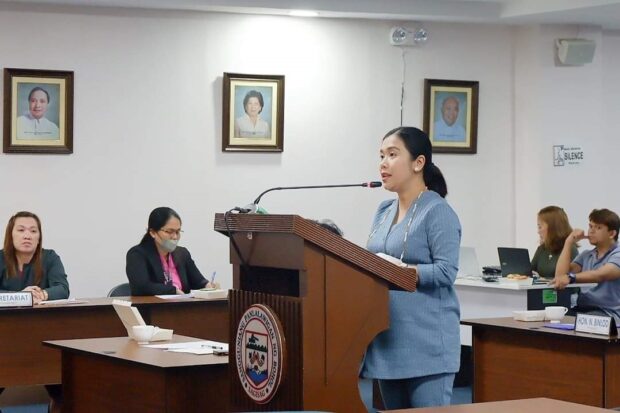NIA office relocation from Bohol to Cebu City opposed

Bohol Board Member Jiselle Rae Aumentado Villamor opposed on Tuesday, May 23, the relocation of the National Irrigation Office in Central Visayas from Bohol to Cebu City. (Contributed photo)
TAGBILARAN CITY — A provincial lawmaker is opposing the relocation to Cebu City of the Central Visayas office of the National Irrigation Office (NIA) from Bohol.
“I am not convinced of the reason to relocate,” said Jiselle Rae Aumentado Villamor in her privilege speech during the provincial board session on Tuesday, May 23.
“I rise to urge earnestly my distinguished colleagues in the Sangguniang Panlalawigan of Bohol to make a stand and rally behind our farmers who are the key drivers, if not one of the key drivers, of our economy and food sustainability, in opposing the proposed relocation of the National Irrigation Administration-Region 7 office to Cebu City from its current location in Bohol,” she added.
The NIA-Central Visayas used to be part of Eastern Visayas as its “mother region” until 2009 when the NIA Board of Directors approved the establishment of a separate office for Central Visayas, Villamor said.
The completion of the Bohol Irrigation Project Phases I and II was one of the major factors for the establishment of the separate Central Visayas office since a national irrigation system (NIS) with an area of 10,000 hectares is required for such.
Article continues after this advertisementVillamor said before the establishment of a separate NIA-Central Visayas office, the regional office was at Dao District in this city, which started as the project office for the irrigation systems being constructed, maintained, and operated in Bohol.
Article continues after this advertisementShe said the NIA-Central Visayas manager and the Executive Committee proposed to the Board of Directors the procurement of a lot in Cebu City to relocate the regional office because this would bring NIA closer to government centers in Cebu City.
Villamor said members of Irrigators Associations (IAs) were not consulted about the relocation proposal.
“As a taxpayer, we deserve to make a stand on where our hard-earned money goes. Why procure and spend millions on lots and/or property in Cebu City when there is already an established and operational office in Bohol?” she said.
Bohol has the highest number of farmer-beneficiaries in Central Visayas at 33,399.
The data show that Bohol may be considered the center of irrigation development in Central Visayas, having the largest total arable area of 260,300 hectares, potential irrigable area of 44,076 hectares, and existing service area of 28,388 hectares.
Cebu ranks only third among the four provinces in the region with arable area of 227,063 hectares, potential irrigable area of 12,515 hectares, and existing service area of 10,925 hectares.
Bohol has 15,687 hectares remaining area for development, while Cebu has only 1,590 hectares.
The NIA-Central Visayas has established the most strategic, convenient, and efficient primary seat of business in Bohol, where the majority of the farmer-beneficiaries are located and where most of the largest irrigation developments are situated.
Villamor said the decision to buy a lot in Cebu City without first deciding whether or not relocation from Bohol to Cebu is feasible and viable for the government does not support the NIA objectives and mission.
Thorough study and review of applicable laws, analysis of data, and consultations with stakeholders, particularly the farmer-beneficiaries and employees are necessary in deciding on the proposal.
Villamor asked the NIA Board of Directors, through its chairman, President Marcos, to defer the proposed relocation of NIA-Central Visayas.
READ:
Tulfo exposes ‘wide-scale corruption scheme’ in NIA, calls for probe
NIA employee survives Maguindanao del Sur ambush